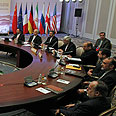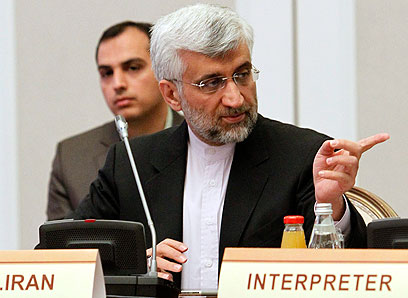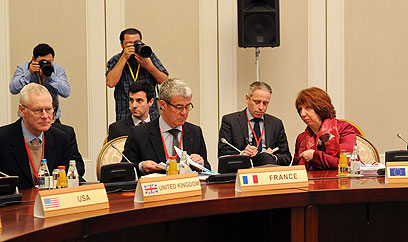
World powers, Iran wrap up crunch nuclear talks
Two days of talks in Kazakhstan conclude with no sign of breakthrough; experts to meet in Istanbul in mid-March, negotiations to resume early April
World powers and Iran on Wednesday wrapped up two days of talks in Kazakhstan aimed at breaking a decade of deadlock over the Iranian nuclear program, but there was no sign they had achieved any breakthrough.
Experts will meet to discuss Tehran's nuclear program in Istanbul on March 17-18 and negotiations will resume on April 5-6, Russian Deputy Foreign Minister Sergei Ryabkov said.
Related stories:
- Images show Iran's Arak plant is operational
- Big powers offer Iran some sanctions relief
- Op-ed: 3 rules to understanding Iran
The first day of grueling negotiations in an upscale hotel in the Kazakh city of Almaty had concluded Tuesday with both sides relieved to have pushed the talks along for another day.
The world powers of the United States, Russia, China, Britain, France and Germany had described the first day of the talks as "useful" without giving further details. Iran said the talks were a "positive step."
"The meeting was useful," Russian news agency Interfax quoted Ryabkov as saying in Almaty, Kazakhstan.

Iran's Saeed Jalili (Photo: AP)
The second day began with a one-on-one session between EU foreign policy chief Catherine Ashton - representing the world powers - and chief Iranian negotiator Saeed Jalili.
All the nations involved then opened a full plenary session behind closed doors. The first day's session lasted three hours but on the second day it wrapped up in just one hour.
"Talks have concluded," said a Western official, adding that details of the meeting would be provided shortly. An Iranian official also confirmed that the talks had now concluded, without giving further details.
The powers made an offer to ease some sanctions on Iran in exchange for concessions on its disputed nuclear program - a proposal that had been discussed in various forms at three previous meetings in the past year.

Ashton and Western envoys (Photo: AFP)
Iranian National Security Council chief Saeed Jalili said the offer was more realistic than what has been offered in the past. He described the new offer - including some relief from international sanctions - as a step to build confidence between the two sides after similar negotiations in Moscow were nearly derailed last June.
"In this round of talks we have witnessed that despite all the attitudes during the last eight months, they tried to get closer to our viewpoints," Jalili told reporters at the close of two days of talks in Kazakhstan's largest city. "We believe this is a turning point."
Jalili did not detail what the sanctions relief might include, or what Iran was willing to do to in exchange.
But he would not budge on Iran's longtime instance, and a main sticking point in the talks.
"Whatever we need, we will of course pursue that - whether it is 5 percent or 20 percent," Jalili said. "It is important to us to have the 20 percent."
EU foreign policy chief Catherine Ashton, who is leading the negotiations, refused to discuss what the potential deal included.
"I hope the Iranians are looking positively on the proposals we put forward," Ashton said. "I believe in looking at what the results are."
"We'll have to see what happens next," Ashton said. "But we approach this with the absolutely united view that we need to see the progress necessary for the confidence the international community needs."
Western negotiators are banking on hopes that easing some sanctions will make Tehran more agreeable to halting production of 20 percent enriched uranium. They also want Iran to suspend enrichment in its underground Fordo nuclear facility, and to ship its stockpile of high-grade uranium out of the country.
But Tehran has said shuttering Fordo is out of the question and that Iran first wants the UN Security Council to withdraw all of the sanctions it has heaped on the nation.
Iran has been unimpressed with earlier offers by the powers to provide it with medical isotopes and lift sanctions on spare parts for civilian airliners, and new bargaining chips that Tehran sees as minor are likely to be snubbed as well.
Iran insists, as a starting point, that world powers must recognize the republic's right to enrich uranium.
AFP, AP and Reuters contributed to this report
- Receive Ynetnews updates directly to your desktop










